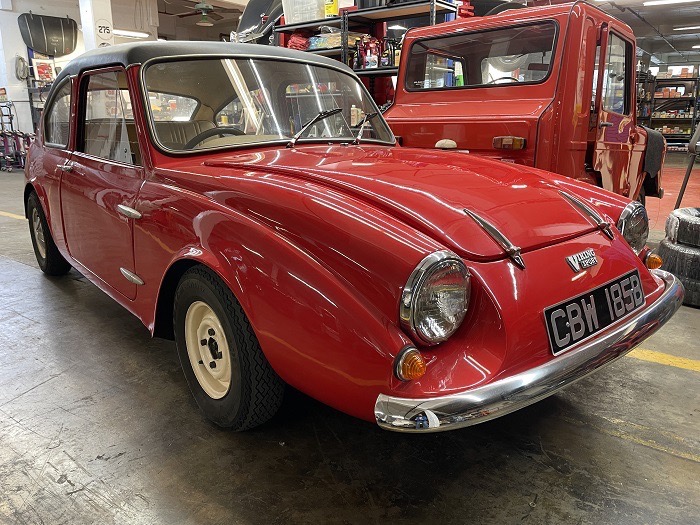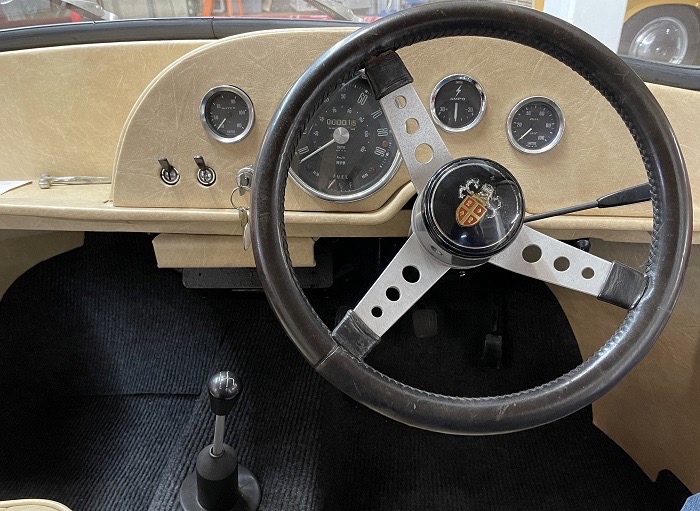Even within the walls of Lane Motor Museum, where I work as the museum’s education director, we have quite a few cars in the collection that are rare and unique within an already rare and unique marque. Today I bring to you the Mini-based Peel Viking Sport.

Most people, not just car people, know about the famous Peel P-50, regarded as the smallest production car ever made. Just in case you’re a Disneyland enthusiast and have stumbled onto this website while looking for tickets for the Autopia ride, I’ll give you a synopsis of Peel Engineering.
Founded in 1940 as a fiberglass manufacturer by Cyril Cannell, Peel Engineering was named after its hometown. The tiny seaport town is on the northwestern coast of the Isle of Man, located off the coast of Scotland, so technically this is a British company. The Isle of Man is also home to the TT (Tourist Trophy) motorcycle race. Peel manufactured fiberglass motorcycle fairings and boat hulls until after the Second World War.


In 1955, Cannell and engineer Henry Kissack developed their first microcar design, known as the Manxcar. The Manxcar never entered production, however, and developed (and perhaps sized down?) the concept into what would become the P-50. The small wonder debuted at the 1962 Earl’s Court Motorcycle Show, probably to the sound of many harrumphs and guffaws from the be-monacled and top-hatted show-goers.

It’s believed that Peel produced less than 50 P-50s from 1962-65, each one slightly different from the other. It was fitted with a 49cc single-cylinder, two-stroke Zweirad Union engine mated to a three-speed gearbox with no reverse gear.

It did however, have a handle on the back so that one could pick it up and turn it around manually.

The success of the P-50 led to the development of the world’s smallest ever two-seater, the Trident. Peel took the P-50’s engine and slapped it into a two-piece, clamshell-designed car. Somewhere around 80 Tridents were made before production stopped in 1966.
A few years ago, I was volun-told to hop in the museum’s Trident for a kidney-smashing jaunt around the block with a young up-and-coming auto journalist who took a railroad crossing in an obnoxiously loud bubble car with practically NO suspension a little too fast, all while we were both slowly asphyxiating in a clear plastic dome. But I digress…

What many folks don’t know is that after the Trident, Peel went on to make a 2+2 GT called the Viking Sport, which debuted in 1966. As far as construction, I’ll let Cyril Cannell tell you himself what was under the skin:
“The entire body shell was moulded in GRP (fiberglass) and as many of the original Mini fittings and components utilized, but with the addition of a raised central floor tunnel to give longitudinal stiffness. A light steel tube frame was bonded internally to connect all the important stress points, termed the ‘bird cage’; the overall appearance reasonably attractive with a rear ‘spoiler’ and the road handling was superb.”

The 1100cc engines also came from BMC, as well as the three-speed gearbox (with reverse!).


The design used modified Mini doors, interior trim, and switchgear.

All of it came together for what I think it a rather good looking mini-grand tourer. It looks like a BMC Mini in a different wrapper, which was a common base for many 1960s and 70s kit cars.

The museum’s Viking Sport is a modern recreation made from a kit. That kit is still available here or you can order a complete car, made from factory moldings.

While I didn’t get it out for a drive this time, it drives, well, like a classic Mini but in a lighter package.
The Viking Sport prototypes, and the molds, were sold to Bill Last, who formed Viking Performance and changed the name of the car to the Viking Minisport. It’s believed that 22 Minisports were manufactured before the run ended in 1970.

Support our mission of championing car culture by becoming an Official Autopian Member.
• The World’s Quirkiest Car Museum Takes You On A Magical Tour Of Taillights And Indicators
• Here’s A Look Inside The World’s Quirkiest Car Museum’s Cabinet Of Bizarre Keys
• Look Inside The Latest Shipment Of Unexpected Cars For America’s Quirkiest Car Museum




Went to the Lane yesterday. It was amazing and the only car museum my wife ever actually liked.
Visited Sunday, not yesterday ….I’m on vacation and can’t remember what day it is..
The only reason I know about this car, and a lot of others, is because of Lane. I also know for a fact that I don’t fit in this car lol
I too, am not built like Richard Hammond. I can only look at cars like this longingly.
Username checks out.
The Manxcar had one of the most interesting doors in automotive history as it was not hinged. It rotated in a track around a single point in the corner which you can kind of make out if you study this photo.
https://gaukmotors.co.uk/photos/Gauk/1955_Peel_Manxman_03.jpg
Who copied whom? The Manxcar or Mott & Cumberford’s Cyclops II?
https://www.lanemotormuseum.org/collection/cars/item/cyclops-two-replica-1957
That kinda broke my brain until I realized the door rotated (which you actually said; comprehension fail!) Weird -and cool because it’s weird. Thanks, Jonee! Got any more weird doors tucked away in the grey matter to share?
There was the Bjelka, a Russian microcar that never got beyond a prototype. The front of the car tipped forward for an Isetta-esque front entry but much less practical.
https://retrorambling.files.wordpress.com/2014/08/1512612_10151976886367605_1254422382_n.jpg
And the Dornier Delta, which was the prototype for the Zundapp Janus, had wacky top hinged doors.
https://www.below-the-radar.com/wp-content/uploads/2020/11/01-Dornier-Delta-1500×1000.jpg
That’s neat Jonee! I ran across that picture but didn’t notice the un-hinged door.
Unhinged is a good way to describe most things associated with Peel engineering.
The rear end looks supra (koff) super!
When we gonna ban this stuff guys? At least give us an option to report it…
It’s weird that none of this bot’s comments have triggered our content filters. I would normally nuke the comment but have decided to edit it instead so I can leave this response behind. I’ll inform whoever is controlling the content filter.
Ideally, we’d have a more robust banning system, but with time, friends!
So, kind of similar to a Mini-Marcos? Also, shouldn’t that be a four-speed gearbox (it looks like in the picture with the steering wheel)?
Yes, much like a Mini-Marcos! And yes, I had the OTHER Peels on the brain. It is a four-speed manual, borrowed from the Mini. Thanks!
I was about to comment the same, but you got to it first.
Technically, the Isle of Man is a crown dependency in personal union with the British crown via the King’s separate title as Lord of Mann, but is not a part of the United Kingdom and is not a UK territory
You are correct, the Isle of Man is NOT part of the UK. Thanks for the clarification.
So an anarcho-syndicalist commune. We take it in turns to act as a sort of executive officer for the week. But all the decision of that officer have to be ratified at a special biweekly meeting. By a simple majority in the case of purely internal affairs, but by a two-thirds majority in the case of more–
Peasant!
Sometimes you don’t want to have to travel as far as Jersey to do your offshore banking, so that’s what the Isle of Man is for.